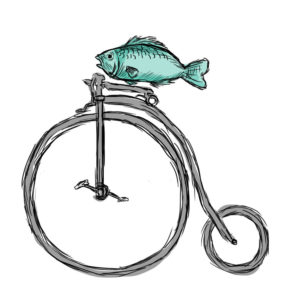Fixing a broken news industry.
February 17, 2017Lara Setrakian/Syria Deeply:
Trust in the media has hit an all-time low; we’re inundated with sensationalist stories, and consistent, high-quality reporting is scarce. She shares three ways we can fix the news and make the complex issues of our time easier to understand.
- Deep reporting/deep domain knowledge
- Journalistic Hippocratic Oath – ‘Do No Harm’
- Embrace complexity…not simplicity. It is a complex world.
[Most importantly, profits and corporate ownership need to be eliminated from journalism and broadcast media. Our country needs to reinstate a true Fourth Estate, the backbone of democracy, i.e., more grassroots media organizations who deep report, take the oath, and embrace complexity.]
Power & Reason
A fish is not like a bicycle, but they’re not mutually exclusive. You can have both.
Part of our culture admires reason. It celebrates learning. It seeks out logic and coherence and an understanding of the how and the why.
At the same time, there are other people who seek out influence and authority. Either to exercise it or to blindly follow it.
Sometimes, they overlap. Sometimes, power is guided by reason. But that’s not required, not in the short run. And sometimes, reasonable, informed people wield power. But again, as a visit to a university’s English department will show, not always.
It’s tempting for the powerful to argue with those that admire reason, pointing out how much power they wield.
And it’s tempting for the well-informed to argue with those that have power, pointing out how little reason they possess.
But just as a fish isn’t going to stop you from riding a bicycle, these arguments rarely work, because power and reason don’t live on the same axis. Listening to someone argue from the other axis is a little like watching TV with the sound off. It might look normal, but it is hard to follow.
Before we engage, we need to agree on what’s being discussed.
-Seth Godin
